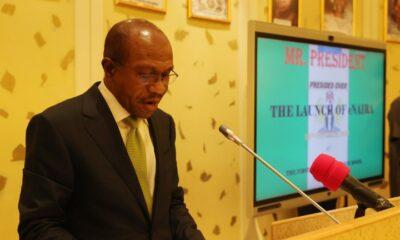- Mixed Reactions as Buhari Nominates Emefiele as CBN Gov
Mixed reactions have greeted the reappointment of the Governor of the Central Bank of Nigeria, Mr Godwin Emefiele.
While some experts said the development was good for the banking sector, monetary policy and economic stability, others thought otherwise.
President Muhammadu Buhari on Thursday wrote to the Senate to approve Emefiele’s reappointment as the CBN governor.
The President, in his letter to the Senate, sought legislative approval of a second tenure for Emefiele, whose current tenure expires on June 2, 2019.
The President of the Senate, Bukola Saraki, read Buhari’s letter to members at the plenary on Thursday.
The Managing Director and Chief Executive Officer, Polaris Bank, Tokunbo Abiru, said, “The re-appointment of the CBN governor for another term of five years is a positive development for our economy.
“The economic outlook remains positive as this adds fillip to the continuity of current macro-economic policies initiated by Emefiele. The positive interventions in the agriculture, real sector and foreign exchange stability give confidence that the economy will continue to grow.”
The Chairman, Chartered Institute of Bankers of Nigeria, Abuja Chapter, Prof.Uche Uwaleke, described Emefiele’s appointment as a positive development for the Nigerian economy, saying stakeholders in the economy would have confidence in the consistency of the monetary policy.
He said, “Emefiele’s appointment is a good omen for the capital market. It is one development that speaks to policy consistency and will further consolidate macroeconomic stability, especially with respect to exchange rate and inflation.
“Investors, both domestic and foreign, can have some degree of confidence in the direction of monetary policy, which is positive for the capital market.
“One thing is now certain: That the interventions by the CBN in critical sectors of the economy, especially agriculture and non-agric based SMEs will continue.
“These will rub off positively on economic recovery efforts, especially now that the CBN under Emefiele has signalled an accommodative monetary policy stance. It is equally positive for financial systems stability. So, I expect a positive reaction.”
The Registrar, Institute of Finance and Control of Nigeria, Mr Godwin Eohoi, said as one of the major actors who worked towards taking Nigeria out of recession, the apex bank boss understood what would be needed to consolidate the growth trajectory.
He also said there was a need for the apex bank boss to ensure the reduction of interest rate is to make the cost of funds cheaper for businesses.
He said, “There is a need for the intensification and effective monitoring of the interventions, in particular, the Anchor Borrower Programme.
“Emefiele should also focus on ensuring increased access to credit by SMEs and generally fostering a low-interest rate environment with the support of fiscal authorities,
“He should focus more on intervention programmes in the agricultural sector, textile and other economic stimulating and job creation sectors.”
A former President, Association of National Accountants of Nigeria, Dr Sam Nzekwe, said, “It is a good development because, given the way he has worked for five years, I think he is a competent man. He has made sure that he has so far stabilised the exchange rate; he has managed the monetary authority very well given the kind of very difficult economy we have.
“I think he has done very well. He performed above average. I think it is a good thing to give him a second chance.”
The Chairman, TAF, Debo Ajayi, who is also an economist, said he had not really considered the governor to have performed well.
He also described some of the actions of the CBN as confusing because he got involved in fiscal policies instead of focusing on monetary policies, which was his key role.
Ajayi said, “Maybe things could have been worse than it actually is but also, I really do not see the CBN managing the economy very well, and yet, the exchange rate seems to have stabilised, but it is still not where it ought to be in terms of the valuation of the naira.
“So, I have not seen any major initiative from the CBN, but evidently, his boss may be looking at it from an angle we are not looking at it from that is making him to recommend him. However, from this side, I don’t see the governor to have done an exceptional job for which he is being recommended for another five years.
“But I do commend them from time to time for some of the initiatives. For instance, the recent one on access to credit in the creative industry is a fantastic one, better late than never. We see some initiatives sometimes like in the area of agriculture, but we have not seen these translate to tangible impact on the masses.”
A professor of Economics at the Olabisi Onabanjo University, Ago Iwoye, Sheriffdeen Tella, said President Muhammadu Buhari re-appointed Emefiele because he felt that he had been able to maintain stable exchange rate and ensured that the inflation rate did not go haywire.
The don, who, however, expressed reservations about the CBN’s direct intervention in the agricultural and the real sectors, added that Emefiele must have earned his re-appointment having been able to help the Buhari’s administration to stabilise the nation’s monetary policy, as it had envisaged it to be.
He said, “I think the President re-appointed him because he is happy with what he has done in the monetary sector. He has stabilised the foreign exchange rate and managed the inflation rate. These must have fallen in line with the President’s policy, but I don’t believe the CBN should be directly involved in giving loans to farmers and those in the real sector of the economy.”



 Naira4 weeks ago
Naira4 weeks ago




 Naira4 weeks ago
Naira4 weeks ago




 Naira4 weeks ago
Naira4 weeks ago




 Naira3 weeks ago
Naira3 weeks ago
 Commodities4 weeks ago
Commodities4 weeks ago


 News4 weeks ago
News4 weeks ago
 Travel4 weeks ago
Travel4 weeks ago




 Naira3 weeks ago
Naira3 weeks ago


















